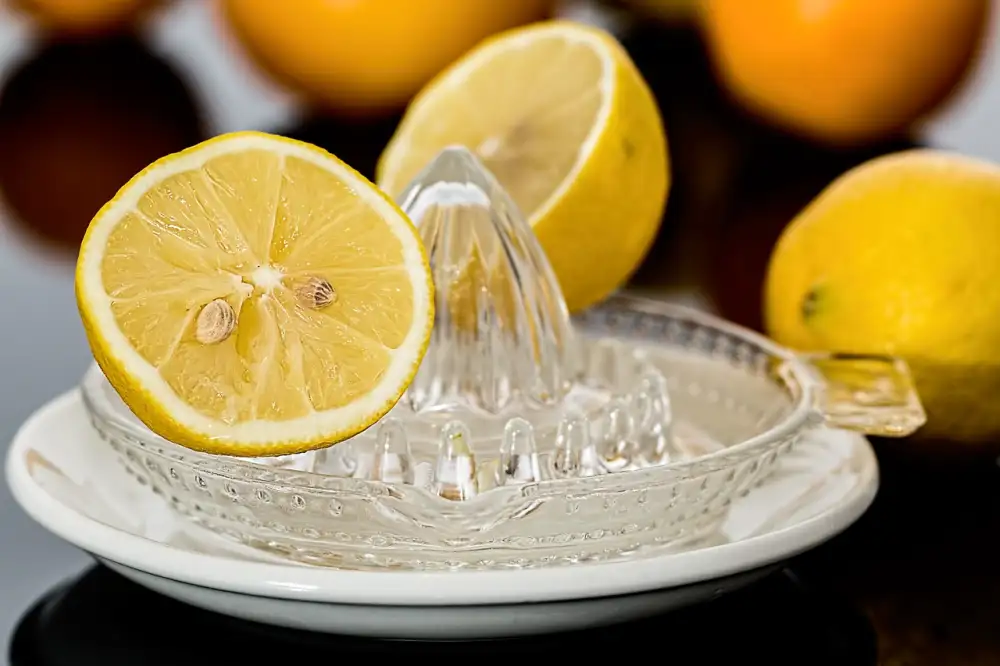The Ultimate Guide to the Best Juicers: Unleash the Magic of Freshly Squeezed Home Delights

- Benefits of having a juicer at home
- Factors to consider when choosing the best juicer
- Top juicer brands and their features
- Comparison of different types of juicers (centrifugal, masticating, and citrus)
- Pros and cons of each juicer type
- Reviews of the best juicers in the market
- Tips for maintaining and cleaning your juicer
- Frequently asked questions about juicers
Juicing has become a popular trend in recent years, as more and more people are discovering the incredible benefits of incorporating fresh juices into their daily routines. Whether you're looking to boost your immune system, detoxify your body, or simply enjoy a refreshing and delicious beverage, juicing offers a world of possibilities.
By extracting the natural juices from fruits and vegetables, juicers allow you to create nutrient-packed concoctions that are bursting with flavor. From vibrant green kale and spinach blends to zesty citrus creations, the options are endless. With a juicer at home, you can unleash your creativity and experiment with different combinations to find your perfect blend.
Not only does juicing provide an easy way to consume a variety of vitamins, minerals, and antioxidants, but it also offers numerous health benefits. Freshly squeezed juices can help improve digestion, promote weight loss, increase energy levels, enhance skin health, and strengthen the immune system. Plus, they taste amazing!
In this ultimate guide to the best juicers, we will explore everything you need to know about choosing the perfect juicer for your home. From understanding the different types of juicers available in the market to learning how to properly maintain and clean them, we've got you covered. So get ready to embark on a journey into the magical world of juicing!
Benefits of having a juicer at home
Having a juicer at home offers numerous benefits that can enhance your overall health and well-being. Firstly, it allows you to enjoy the goodness of freshly squeezed juices anytime you want. By extracting juice from fruits and vegetables, you can easily incorporate more nutrients into your diet. Juices are packed with vitamins, minerals, and antioxidants that promote a strong immune system and improve digestion.
Another advantage of having a juicer is the ability to customize your blends according to your taste preferences. You have full control over the ingredients, ensuring that there are no added sugars or preservatives. This is particularly beneficial for individuals with dietary restrictions or those looking to reduce their sugar intake.
Furthermore, juicing provides a convenient way to consume a variety of fruits and vegetables in one sitting. It can be challenging to eat the recommended daily servings of produce, but by juicing them, you can easily meet your nutritional needs. Additionally, juicing allows for better absorption of nutrients as they are in liquid form.
Not only does juicing benefit your health, but it also promotes sustainability. By using leftover fruits and vegetables or incorporating imperfect produce into your juices, you reduce food waste. This is not only environmentally friendly but also cost-effective.
In conclusion, having a juicer at home offers numerous benefits such as easy access to fresh juices packed with nutrients, customization options for taste preferences and dietary restrictions, convenience in meeting daily fruit and vegetable servings, improved nutrient absorption, and promoting sustainability by reducing food waste.
Factors to consider when choosing the best juicer
When choosing the best juicer for your home, there are several factors to consider. First, think about the type of produce you will be juicing most frequently. Some juicers are better suited for leafy greens and soft fruits, while others are more effective with hard vegetables and citrus fruits.
Next, consider the speed and power of the juicer. A higher RPM (rotations per minute) can result in faster juice extraction, but it may also generate more heat and reduce nutrient quality. Look for a juicer with a powerful motor that can handle tough ingredients without overheating.
Another important factor is the size and design of the juicer. If you have limited counter space, a compact or vertical juicer might be a better choice. Additionally, consider ease of use and cleaning. Look for features like wide feeding tubes and dishwasher-safe parts to simplify your juicing experience.
Lastly, take into account your budget. Juicers can range in price from affordable to high-end models with advanced features. Determine your budget beforehand and choose a juicer that offers good value for money without compromising on quality.
By considering these factors, you can find the best juicer that suits your needs and helps you unleash the magic of freshly squeezed home delights.
Top juicer brands and their features
When it comes to choosing the best juicer, there are several top brands that stand out in the market. These brands offer a range of features and options to suit different needs and preferences.
1. Breville: Known for their high-quality juicers, Breville offers powerful machines with innovative features such as extra-wide feed chutes and variable speed settings. Their juicers are also easy to clean and come with durable stainless steel blades.
2. Omega: Omega is renowned for its masticating juicers, which use a slow grinding process to extract juice from fruits and vegetables. These juicers are known for their efficiency in extracting maximum nutrients and producing high-quality juice with minimal oxidation.
3. Hurom: Hurom specializes in slow juicers that utilize a patented Slow Squeeze Technology to gently extract juice while preserving the natural taste and nutrients of the ingredients. Their juicers are also compact and quiet, making them ideal for small kitchens or noise-sensitive environments.
4. Cuisinart: Cuisinart offers a range of centrifugal juicers that provide fast and efficient juice extraction. These juicers feature powerful motors, large pulp containers, and easy-to-use controls. They are also designed with safety features such as locking mechanisms to prevent accidents during operation.
5. Tribest: Tribest is known for its versatile juicers that can handle a variety of tasks beyond just juicing, such as making nut butter or sorbets. Their machines are also designed with user-friendly features like reverse function for unclogging and easy assembly/disassembly for cleaning.
Each brand has its own unique features and advantages, so it's important to consider your specific needs before making a decision. Whether you prioritize speed, nutrient retention, versatility, or ease of use, there's a top brand out there that can cater to your preferences.
Comparison of different types of juicers (centrifugal, masticating, and citrus)
When it comes to choosing the best juicer for your home, it's important to understand the different types available in the market. The three main types of juicers are centrifugal, masticating, and citrus.
Centrifugal juicers are the most common and popular type. They work by using a fast-spinning blade to extract juice from fruits and vegetables. They are generally affordable and easy to use, making them a great option for beginners. However, they can be quite noisy and may not extract as much juice as other types.
Masticating juicers, also known as slow juicers or cold press juicers, use a slow grinding and chewing motion to extract juice. They operate at a lower speed than centrifugal juicers, which helps preserve more nutrients in the juice. Masticating juicers are ideal for extracting juice from leafy greens and wheatgrass. They are quieter than centrifugal juicers but tend to be more expensive.
Citrus juicers are specifically designed for extracting juice from citrus fruits like oranges, lemons, and grapefruits. They come in both manual and electric versions. Manual citrus juicers require you to manually squeeze the fruit onto a reamer or cone-shaped device to extract the juice. Electric citrus juicers automate this process, making it quicker and easier.
Each type of juicer has its own advantages and disadvantages depending on your specific needs and preferences. Consider factors such as ease of use, noise level, price range, versatility, and nutrient retention when making your decision.
Now that you have an understanding of the different types of juicers available in the market, let's dive deeper into their pros and cons to help you make an informed choice for your home.
Pros and cons of each juicer type
When it comes to choosing the best juicer for your home, it's important to consider the pros and cons of each type.
Centrifugal juicers are known for their speed and convenience. They can quickly extract juice from fruits and vegetables, making them ideal for busy individuals. However, they tend to produce more foam and may not be as efficient in extracting juice from leafy greens.
Masticating juicers, on the other hand, operate at a slower speed and use a chewing or grinding motion to extract juice. This method preserves more nutrients and enzymes in the juice, making it healthier and longer-lasting. However, masticating juicers are generally more expensive and require more time for preparation and cleaning.
Citrus juicers are specifically designed for squeezing citrus fruits like oranges and lemons. They are simple to use and clean, making them perfect for those who primarily enjoy citrus juices. However, they have limited functionality compared to centrifugal or masticating juicers.
Ultimately, the choice of juicer depends on your personal preferences and needs. If you value speed and convenience, a centrifugal juicer may be your best bet. If you prioritize nutrient retention and versatility, a masticating juicer might be worth the investment. And if you're mainly interested in citrus juices, a dedicated citrus juicer will do the job perfectly.
Consider your lifestyle, budget, and desired features before making a decision. Remember that each type has its own advantages and disadvantages – finding the right balance is key to unlocking the magic of freshly squeezed home delights!
Reviews of the best juicers in the market
Reviews of the Best Juicers in the Market:
1. Breville Juice Fountain Elite: This centrifugal juicer is a powerhouse, extracting juice quickly and efficiently. It has a large feed chute, making it easy to process whole fruits and vegetables. The stainless steel construction ensures durability, while the powerful motor guarantees maximum juice extraction.
2. Omega NC800HDS: As a masticating juicer, this model operates at a slower speed, preserving nutrients and enzymes in the juice. It can handle leafy greens and wheatgrass with ease, producing high-quality juice with minimal foam. The adjustable end cap allows for customized pulp control.
3. Cuisinart CCJ-500 Pulp Control Citrus Juicer: If you're a fan of citrus juices, this electric citrus juicer is perfect for you. With its sleek design and efficient performance, it extracts every drop of juice from oranges, lemons, and grapefruits. The pulp control feature lets you customize your juice's consistency.
4. Hurom H-AA Slow Juicer: This masticating juicer is known for its quiet operation and impressive yield of juice. It utilizes an advanced slow squeeze technology to extract every bit of nutrition from fruits and vegetables. The sleek design adds a touch of elegance to any kitchen countertop.
5. Tribest CS-1000 CitriStar Electric Citrus Juicer: For those who prefer simplicity, this affordable citrus juicer is a great choice. With its powerful motor and easy-to-use features, it effortlessly extracts juice from all types of citrus fruits. The stainless steel strainer ensures smooth and pulp-free results.
These top-rated juicers offer exceptional performance and versatility to suit different preferences and needs. Choose one that aligns with your requirements to enjoy the magic of freshly squeezed juices at home!
Tips for maintaining and cleaning your juicer
Maintaining and cleaning your juicer is essential to ensure its longevity and optimal performance. Here are some tips to keep your juicer in top shape:
1. Read the instruction manual: Familiarize yourself with the manufacturer's recommendations for cleaning and maintenance.
2. Clean after each use: Rinse all removable parts immediately after juicing to prevent pulp from drying and sticking. Use a brush or sponge to remove any residue.
3. Disassemble properly: Take apart your juicer carefully, following the instructions provided. Pay attention to small crevices where pulp can accumulate.
4. Soak in warm soapy water: Fill a sink or basin with warm water and add a mild detergent. Submerge the removable parts for a few minutes to loosen any stubborn debris.
5. Scrub gently: Use a soft brush or sponge to scrub away remaining pulp or stains. Avoid using abrasive materials that could damage the juicer's surfaces.
6. Rinse thoroughly: After cleaning, rinse all parts under running water to remove any soap residue.
7. Dry completely: Allow all components to air dry completely before reassembling your juicer. Moisture can promote mold growth or cause electrical issues.
8. Store properly: Once dry, store your juicer in a clean, dry place away from direct sunlight or moisture.
By following these simple tips, you'll ensure that your juicer remains in excellent condition, providing you with delicious and nutritious juices for years to come!
Frequently asked questions about juicers
1. How do I choose the right juicer for my needs?
Consider factors such as the type of produce you'll be juicing, your budget, and the ease of cleaning.
2. Can I juice leafy greens with a centrifugal juicer?
Centrifugal juicers are not as efficient at extracting juice from leafy greens. Consider a masticating juicer for better results.
3. How noisy are juicers?
Centrifugal juicers tend to be louder due to their high-speed motors. Masticating and citrus juicers are generally quieter.
4. Can I make nut milk with a juicer?
Yes, some masticating juicers have the capability to make nut milk by grinding soaked nuts and straining the pulp.
5. Are all parts of a juicer dishwasher safe?
Not all parts are dishwasher safe. It's important to check the manufacturer's instructions for specific cleaning guidelines.
6. How long can I store fresh juice?
Freshly squeezed juice is best consumed immediately for maximum nutritional benefits. However, it can be stored in an airtight container in the refrigerator for up to 72 hours.
7. Can I use frozen fruits and vegetables in a juicer?
Yes, most juicers can handle frozen produce, but it's recommended to thaw them slightly before juicing for better results.
8. Do I need to peel fruits and vegetables before juicing?
It depends on the type of fruit or vegetable and your personal preference. Citrus fruits should be peeled, while other produce like apples or cucumbers can be left unpeeled if desired.
9. Can I juice wheatgrass with any type of juicer?
Masticating or twin gear juicers are best suited for extracting juice from wheatgrass due to their slow speed and strong crushing ability.
10. Are there any safety precautions when using a juicer?
Always follow the manufacturer's instructions for safe operation. Avoid inserting your fingers or utensils into the feeding chute while the juicer is running.
In conclusion, finding the perfect juicer for your home is a personal decision based on your individual needs and preferences. Consider factors such as the type of juice you want to make, the ease of use and cleaning, and your budget. Whether you choose a centrifugal, masticating, or citrus juicer, each has its own pros and cons. Research top brands like Breville, Omega, and Cuisinart to find the features that best suit your requirements. Remember to read reviews from other users to get an idea of their experiences. With proper maintenance and regular cleaning, your juicer will continue to provide you with fresh and nutritious juices for years to come. So go ahead and unleash the magic of freshly squeezed home delights with the perfect juicer for you!
Published: 16. 12. 2023
Category: Home



